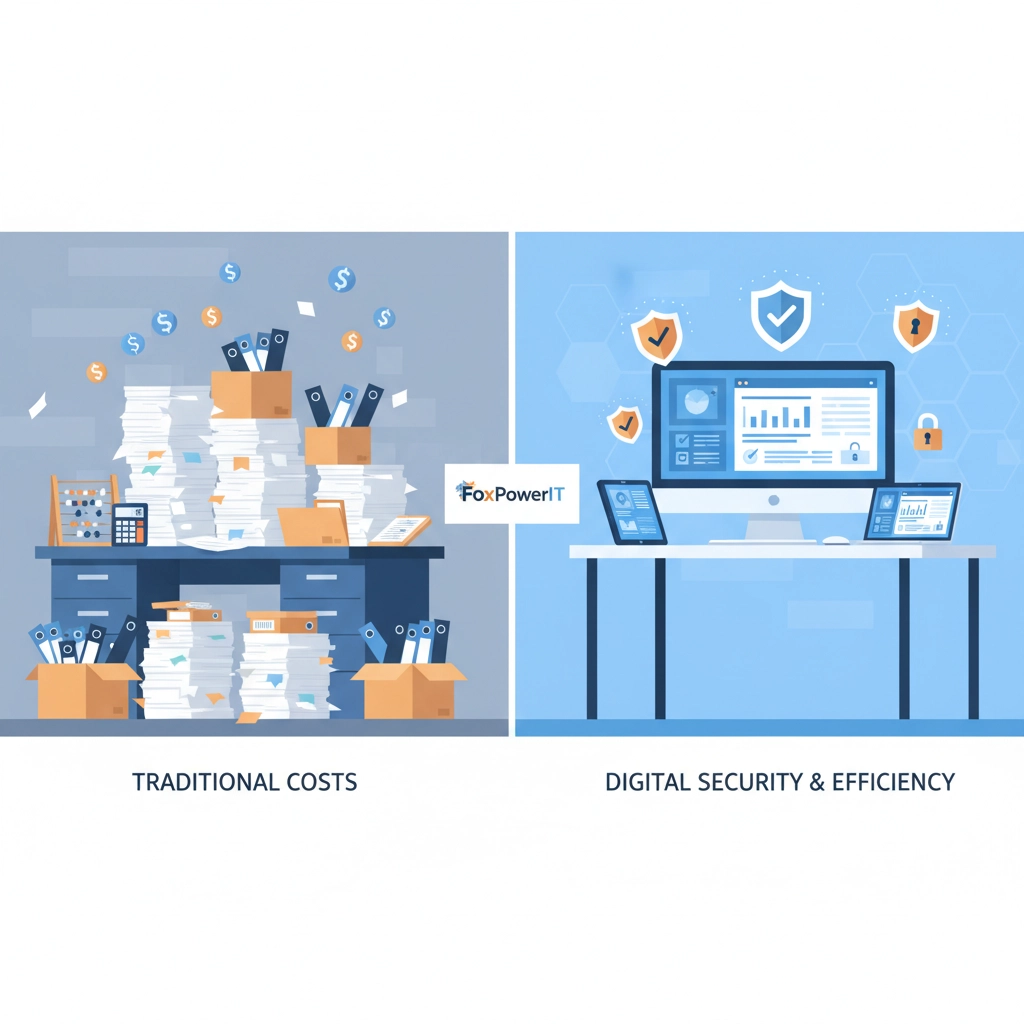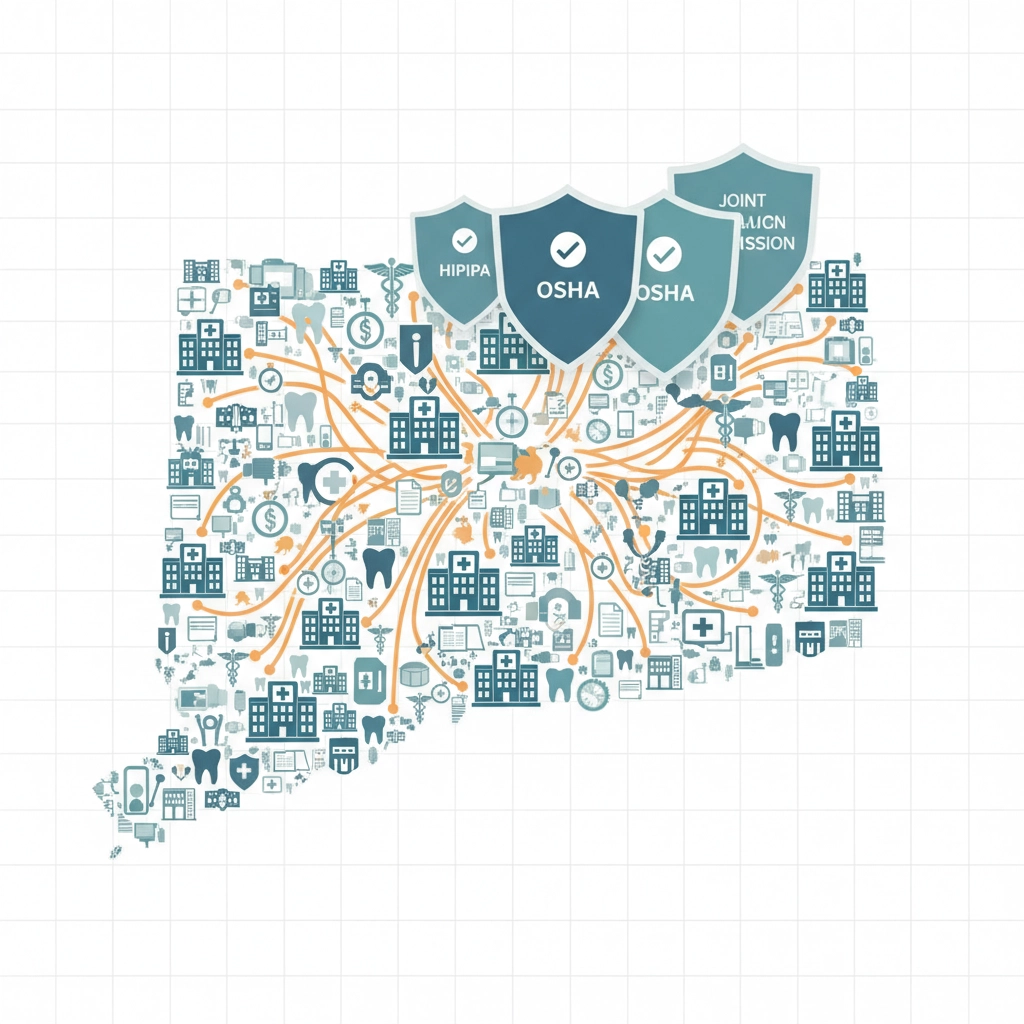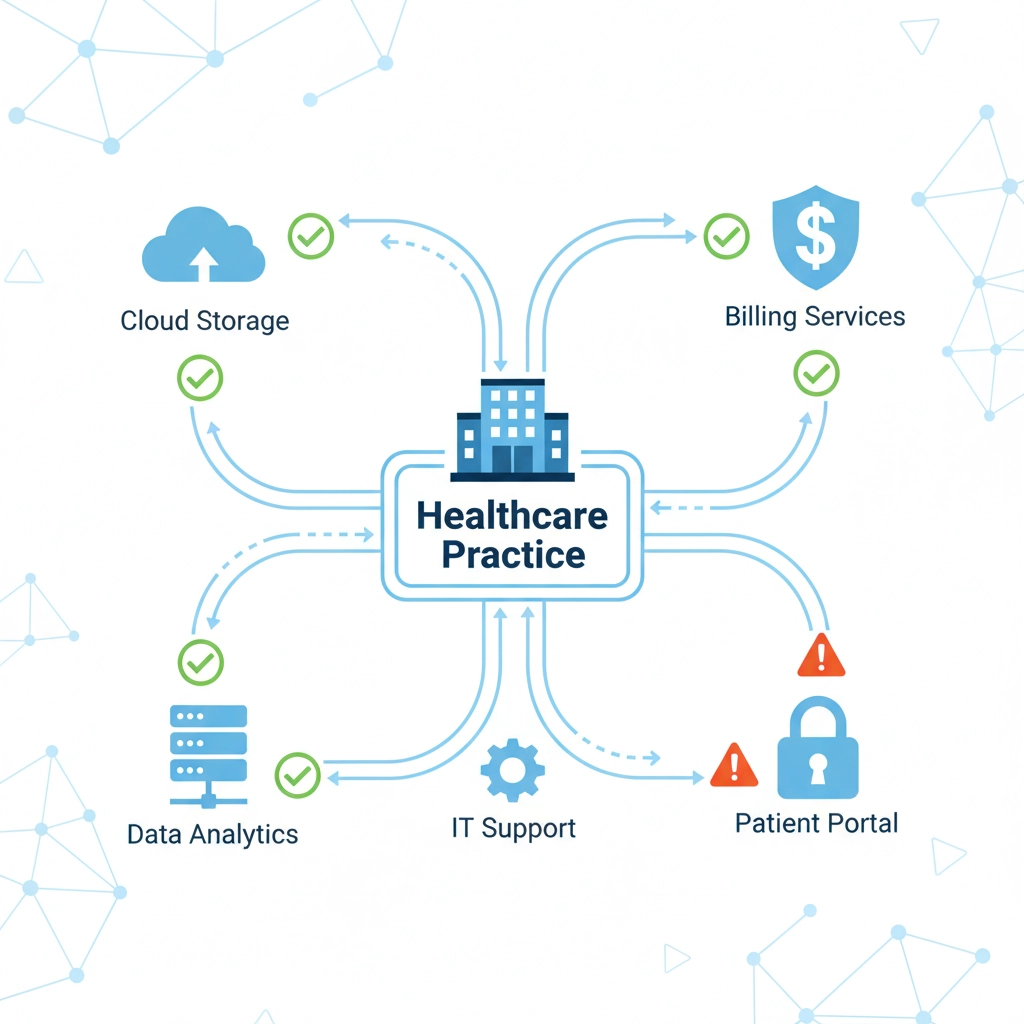Connecticut healthcare and dental practices are facing an unprecedented compliance crisis. Recent regulatory developments and increased enforcement activities are putting practices at risk of devastating financial penalties that can reach well into six figures. If you're a healthcare provider in Connecticut, the cost of HIPAA non-compliance has never been higher: and the margin for error has never been smaller.
The landscape of healthcare data protection has fundamentally shifted. What used to be occasional audits and warnings have transformed into aggressive enforcement actions that can shut down practices overnight. Connecticut practices are particularly vulnerable due to the state's stringent privacy laws working in conjunction with federal HIPAA requirements, creating a complex web of compliance obligations that many providers struggle to navigate.
This isn't just about paperwork anymore. Modern healthcare operates in a digital ecosystem where patient data flows through electronic health records, cloud-based practice management systems, telehealth platforms, and mobile devices. Each touchpoint represents a potential compliance failure that can trigger investigations, fines, and reputation damage that takes years to recover from.
The Real Cost of HIPAA Non-Compliance in 2025
The financial penalties for HIPAA violations have escalated dramatically. Recent enforcement actions show fines ranging from $100,000 for smaller practices to multi-million dollar settlements for larger healthcare organizations. But the direct fines are just the beginning of your financial exposure.
Connecticut practices face a perfect storm of compliance risks. State privacy laws now impose additional requirements on top of federal HIPAA obligations. The Connecticut Data Privacy Act, which expanded significantly in 2025, creates overlapping compliance requirements that many practices don't even realize they're subject to.
Beyond fines, non-compliance triggers a cascade of costs that can devastate a practice. Legal fees for responding to investigations easily reach $50,000-$100,000 before you even know if you'll face penalties. Forensic analysis of your systems and data breach response can add another $75,000-$150,000. Patient notification requirements, credit monitoring services, and reputation management push costs even higher.

The indirect costs are often more devastating than the fines themselves. Patients lose trust and leave your practice. Referral sources dry up. Your malpractice insurance premiums skyrocket. New patient acquisition becomes exponentially more expensive when your practice is associated with a data breach or compliance violation.
Connecticut dental practices face particular vulnerability because they often lack dedicated IT staff while handling sensitive patient information across multiple systems. Dental offices typically use practice management software, digital imaging systems, patient communication platforms, and payment processing systems: all of which must meet strict HIPAA requirements.
Medical practices aren't immune either. The shift to telehealth during the pandemic introduced new compliance risks that many practices still haven't properly addressed. Video conferencing platforms, remote monitoring devices, patient portals, and mobile health apps all create potential violation points that regulators are actively scrutinizing.
Understanding Connecticut's Enhanced Privacy Landscape
Connecticut has positioned itself as a leader in privacy protection, creating additional compliance layers that healthcare practices must navigate. The state's expanded privacy protections for reproductive and gender-affirming care, effective July 2025, specifically impact how healthcare providers handle sensitive medical information.
Under these enhanced protections, HIPAA business associates are now subject to the same restrictions as covered entities when handling reproductive health information. This means your IT vendors, cloud storage providers, billing companies, and other business associates must implement additional safeguards beyond standard HIPAA requirements.
The implications are significant. Your practice can no longer rely on standard business associate agreements for vendors handling reproductive health data. You need enhanced agreements that specifically address Connecticut's additional requirements. Failure to update these agreements creates immediate compliance gaps that regulators can exploit.
Connecticut's Data Privacy Act also expanded to cover more healthcare entities. If your practice processes personal data of 35,000 or more Connecticut residents, or handles sensitive data beyond payment processing, you're now subject to additional state privacy requirements on top of HIPAA obligations.
This dual-layer compliance requirement creates complexity that most practices aren't prepared to handle. You need systems and processes that satisfy both federal HIPAA requirements and Connecticut state privacy laws. The intersection of these requirements often creates compliance obligations that exceed what either law requires individually.

Healthcare practices also must navigate Connecticut's specific breach notification requirements, which can differ from federal HIPAA breach notification rules. Understanding when and how to report potential breaches to both federal and state authorities is critical to avoiding escalated penalties.
The Top HIPAA Compliance Failures Putting Connecticut Practices at Risk
Regulatory enforcement data reveals that certain types of violations consistently trigger the highest penalties. Connecticut practices are making predictable mistakes that create massive financial exposure.
Inadequate Access Controls represent the most common and expensive compliance failure. Practices routinely grant excessive system access to employees who don't need it for their job functions. When employees can access patient records they shouldn't see, every access becomes a potential violation. A single employee inappropriately accessing hundreds of patient records can trigger penalty calculations that reach six figures.
Modern practice management systems often default to broad access permissions, meaning new employees receive access to far more patient data than their role requires. Without proper access controls and regular audits, practices create ongoing violations that compound over time.
Business Associate Agreement Failures create immediate compliance gaps that regulators prioritize for enforcement. Connecticut practices routinely fail to obtain proper business associate agreements from vendors, or they use outdated agreements that don't meet current requirements.
Cloud storage providers, email services, billing companies, IT support vendors, and even cleaning services that might access areas containing patient information require proper business associate agreements. The expanded Connecticut privacy requirements mean many existing agreements are now insufficient and need immediate updates.
Encryption and Data Security Deficiencies trigger the highest financial penalties because they represent willful neglect of patient data protection. Practices that store or transmit patient data without proper encryption face penalties that assume malicious intent rather than simple oversight.
Unencrypted laptops, mobile devices, email communications, and cloud storage create immediate violation exposure. Connecticut practices are particularly vulnerable because many use consumer-grade technology solutions that don't meet HIPAA security requirements.
Employee Training Gaps represent a systemic failure that amplifies all other compliance risks. Practices that can't demonstrate comprehensive, ongoing HIPAA training for all employees face penalties that assume the violations were foreseeable and preventable.
Connecticut's enhanced privacy requirements mean existing training programs are likely insufficient. Employees need updated training on state-specific requirements in addition to federal HIPAA obligations.
Incident Response Failures transform minor compliance gaps into major enforcement actions. Practices that don't properly investigate, document, and report potential breaches face penalties that far exceed the original incident's scope.
The most expensive mistakes happen when practices discover potential breaches but fail to conduct proper risk assessments or delay reporting to regulators. These procedural failures often trigger larger penalties than the underlying security incident.
FoxPowerIT's 5-Step HIPAA Compliance Framework
Based on our experience helping Connecticut healthcare and dental practices navigate complex compliance requirements, we've developed a systematic approach that addresses the most critical risk areas while building sustainable compliance processes.
Step 1: Comprehensive Compliance Assessment and Gap Analysis
Effective HIPAA compliance starts with understanding your current risk profile. Most practices operate with significant compliance gaps they don't even realize exist. Our assessment process identifies every potential violation point across your entire operation.
We evaluate your physical safeguards, including how patient information is stored, who has access to different areas of your practice, and whether workstations are properly secured. Physical security failures create some of the most expensive violations because they're considered easily preventable.
Technical safeguards receive intensive scrutiny. We analyze how you control access to electronic patient information, whether your systems properly authenticate users, and if you're maintaining adequate audit logs. Connecticut practices often discover they're missing critical technical controls that create immediate compliance exposure.
Administrative safeguards evaluation covers your policies, procedures, training programs, and incident response processes. These procedural requirements are where many practices fail because they're not technology problems: they're process and documentation problems that require ongoing attention.
Our assessment includes Connecticut-specific privacy requirements that many practices overlook. We ensure your policies and procedures address state privacy obligations in addition to federal HIPAA requirements.
The assessment produces a prioritized remediation plan that addresses the highest-risk compliance gaps first. This approach helps you achieve compliance while managing costs and minimizing operational disruption.
Step 2: Technical Infrastructure Hardening and Security Implementation
Connecticut healthcare practices need robust technical controls that satisfy both HIPAA requirements and state privacy obligations. Our infrastructure hardening process implements enterprise-grade security measures scaled appropriately for smaller practices.

Network security implementation starts with proper network segmentation that isolates patient data systems from general business networks. We implement firewalls, intrusion detection systems, and network monitoring that provide real-time visibility into who's accessing patient information and how.
Endpoint protection goes beyond basic antivirus to include advanced threat detection, device encryption, and remote wipe capabilities for mobile devices. Connecticut practices are particularly vulnerable to endpoint security failures because employees often use personal devices for practice-related activities.
Our vulnerability scanning services provide ongoing assessment of your technical security posture. Regular vulnerability scans identify potential security gaps before they become compliance violations or data breaches.
Cloud security implementation ensures that any cloud-based systems meet HIPAA requirements and include proper business associate agreements. We help practices evaluate cloud vendors, implement proper data encryption, and maintain control over patient information stored in cloud systems.
Email security is critical because healthcare communications often contain patient information. We implement secure email solutions that provide encryption, access controls, and audit trails that satisfy both HIPAA and Connecticut privacy requirements.
Our security management services provide ongoing monitoring and maintenance of your technical security controls. Security isn't a one-time implementation: it requires continuous monitoring and updates to remain effective.
Step 3: Access Control and User Management Optimization
Proper access controls represent the most critical element of HIPAA compliance. Connecticut practices need systems that ensure employees can only access patient information necessary for their job functions while maintaining detailed audit trails of all access activities.
User provisioning processes ensure new employees receive appropriate access permissions based on their specific role. We implement role-based access controls that automatically limit what information each employee can see based on their job responsibilities.
Regular access reviews identify employees who have excessive permissions or who no longer need access to certain systems. Many compliance violations result from employees retaining access to systems they no longer use in their current role.
Multi-factor authentication implementation adds critical security layers that prevent unauthorized access even if passwords are compromised. Connecticut practices are particularly vulnerable to password-based attacks because healthcare employees often use weak passwords or reuse passwords across multiple systems.
Audit trail implementation ensures you can track every access to patient information. Regulators expect detailed logs showing who accessed what information, when they accessed it, and what they did with it. These audit trails are critical for demonstrating compliance during investigations.
Our network administration services include ongoing user management and access control maintenance. Access permissions need regular review and adjustment as employees change roles or leave the organization.
Step 4: Business Associate Agreement Management and Vendor Risk Assessment
Connecticut practices work with dozens of vendors who have access to patient information, either directly or indirectly. Each vendor relationship requires proper business associate agreements and ongoing risk management.
Vendor inventory development identifies every vendor who might have access to patient information. This includes obvious vendors like IT support and billing companies, but also less obvious vendors like cleaning services, equipment maintenance companies, and telecommunications providers.
Business associate agreement review ensures all vendor agreements meet current HIPAA requirements and Connecticut-specific privacy obligations. Many existing agreements are outdated and don't address current regulatory requirements.
Vendor risk assessment evaluates each vendor's security practices and compliance posture. Not all vendors have the same risk profile, and your oversight responsibilities vary based on the vendor's access to patient information.

Ongoing vendor monitoring ensures your business associates maintain appropriate security measures over time. Vendor security practices can degrade, and you need processes to identify and address vendor-related compliance risks.
Contract management includes termination procedures that ensure patient information is properly returned or destroyed when vendor relationships end. Improper data handling during contract terminations creates significant compliance exposure.
Step 5: Ongoing Training, Monitoring, and Incident Response
HIPAA compliance requires ongoing attention rather than one-time implementation. Connecticut practices need sustainable processes that maintain compliance over time while adapting to changing regulatory requirements.
Employee training programs must address both federal HIPAA requirements and Connecticut-specific privacy obligations. Training needs to be role-specific, regularly updated, and documented to demonstrate compliance during regulatory investigations.
Our IT security awareness training services provide comprehensive training programs designed specifically for Connecticut healthcare practices. Training covers both technical security practices and regulatory compliance requirements.
Incident response procedures ensure you can quickly identify, contain, and report potential HIPAA violations or data breaches. The first 24-48 hours after discovering a potential incident are critical for minimizing regulatory exposure.
Regular compliance monitoring identifies potential violations before they become regulatory problems. We provide ongoing monitoring services that track access patterns, identify unusual activities, and flag potential compliance issues.
Documentation management ensures you maintain the detailed records regulators expect during investigations. Proper documentation can be the difference between a warning letter and a six-figure fine.
The Business Case for Proactive HIPAA Compliance
Connecticut healthcare and dental practices face a stark choice: invest in proper compliance now, or risk devastating financial penalties later. The math is straightforward when you compare compliance costs with potential fines and business disruption.
Proper HIPAA compliance implementation typically costs Connecticut practices $15,000-$35,000 annually, depending on practice size and complexity. This investment covers technical security measures, employee training, policy development, and ongoing monitoring.
Compare this with the average cost of a HIPAA violation: $3.2 million for healthcare organizations, including fines, legal fees, notification costs, and business disruption. Even smaller violations that result in $100,000-$500,000 in direct fines trigger additional costs that often exceed $1 million.
The business benefits extend beyond avoiding penalties. Practices with strong HIPAA compliance programs experience fewer data breaches, reduced cyber insurance premiums, improved operational efficiency, and enhanced patient trust.
Connecticut practices also benefit from competitive advantages when they can demonstrate superior data protection practices. Patients increasingly consider privacy and security when choosing healthcare providers, particularly for sensitive medical services.

Referral sources, including other healthcare providers and insurance companies, are more comfortable working with practices that demonstrate strong compliance practices. Your compliance posture affects your ability to participate in networks, receive referrals, and grow your practice.
Technology Solutions That Support Connecticut Healthcare Compliance
Modern HIPAA compliance requires technology solutions specifically designed for healthcare environments. Connecticut practices need systems that satisfy regulatory requirements while supporting efficient clinical operations.
Electronic health record systems must include proper access controls, audit trails, encryption, and business associate agreements. Many EHR vendors have enhanced their security features, but practices need to properly configure and maintain these systems.
Practice management systems handle appointment scheduling, billing, and patient communications: all of which involve patient information. These systems need the same security controls as clinical systems, but many practices treat them as lower-risk applications.
Communication systems, including email, patient portals, and telehealth platforms, create significant compliance risks if not properly secured. Connecticut practices need communication solutions specifically designed for healthcare use.
Backup and disaster recovery systems must maintain the same security controls as primary systems. Patient data backups stored without proper encryption or access controls create compliance violations even if the primary systems are secure.
Our infrastructure management services help Connecticut practices implement and maintain technology solutions that support both operational efficiency and regulatory compliance.
Building a Sustainable Compliance Culture
Long-term HIPAA compliance success requires more than technology and policies: it requires a culture where every employee understands their role in protecting patient information.
Leadership commitment demonstrates that compliance is a business priority rather than just a regulatory requirement. Practice owners and managers need to visibly support compliance initiatives and allocate appropriate resources.
Employee engagement ensures staff understand how compliance requirements affect their daily activities. Compliance can't be just an annual training requirement: it needs to be integrated into normal business operations.
Patient communication about your privacy practices builds trust and demonstrates your commitment to data protection. Patients need to understand how you protect their information and what they can expect from your privacy practices.
Continuous improvement processes ensure your compliance program adapts to changing regulatory requirements and business needs. HIPAA compliance is not a destination: it's an ongoing process that requires regular attention and updates.
Taking Action: Your Next Steps for HIPAA Compliance
Connecticut healthcare and dental practices can't afford to delay HIPAA compliance improvements. Regulatory enforcement continues to intensify, and the financial consequences of violations continue to increase.
Start with a comprehensive compliance assessment that identifies your highest-risk areas. Focus on implementing critical security controls before addressing procedural improvements. Prioritize employee training and business associate agreement updates.
Don't try to address everything simultaneously. Effective compliance implementation requires prioritizing the most critical risks while building sustainable processes that maintain compliance over time.
Partner with IT professionals who understand healthcare compliance requirements. Generic IT services aren't sufficient for healthcare practices: you need specialists who understand both technology and regulatory requirements.
FoxPowerIT specializes in helping Connecticut healthcare and dental practices achieve and maintain HIPAA compliance. Our team understands the unique challenges facing Connecticut practices and provides practical solutions that satisfy regulatory requirements while supporting your business operations.
The cost of proper compliance is always less than the cost of violations. Don't wait for a regulatory investigation or data breach to discover your compliance gaps. Contact FoxPowerIT today to assess your current compliance posture and develop a plan that protects your practice from costly violations.
Connecticut practices that act now can achieve robust compliance while their competitors struggle with regulatory enforcement actions. The question isn't whether HIPAA enforcement will continue to intensify: the question is whether your practice will be ready.
Your patients trust you with their most sensitive information. Your business depends on maintaining that trust while satisfying increasingly complex regulatory requirements. Don't leave your practice's future to chance: invest in proper HIPAA compliance today.
Visit FoxPowerIT.com to schedule your compliance assessment and protect your practice from devastating HIPAA violations. Your patients' privacy and your practice's future depend on the decisions you make today.

